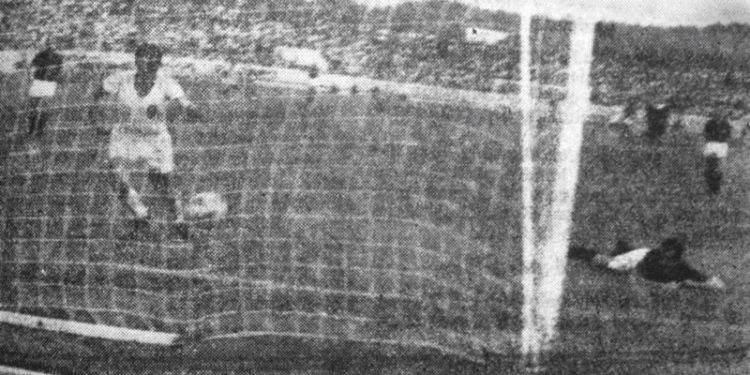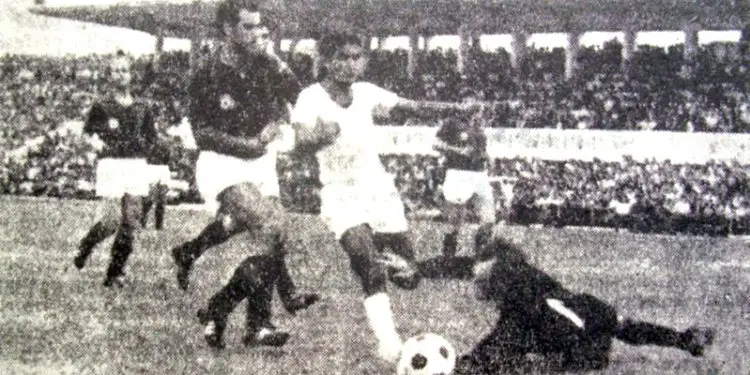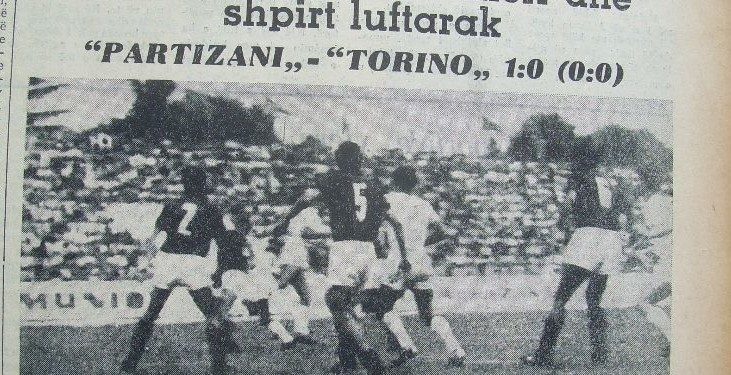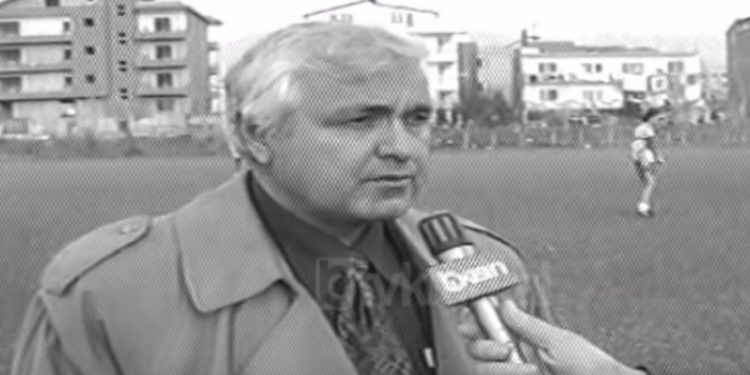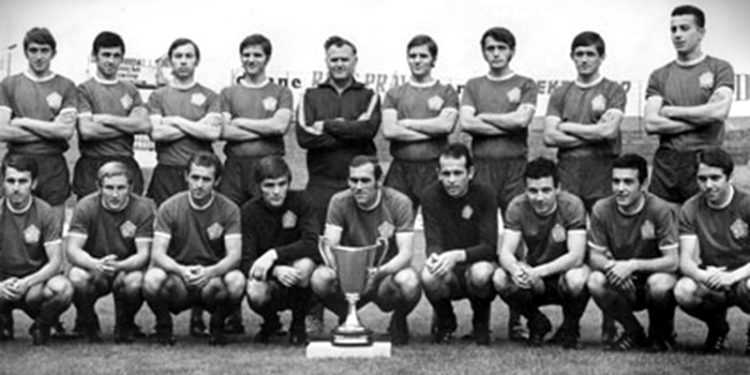Nga Uvil Zajmi
Memorie.al / It is the 60th anniversary of that special match, which remains historic for many reasons. It was the first match after the war against an Italian football team. It was a “Partizan” reformed by coach Refik Resmja, in search of a restructured team after the events of ’67; for the sensational 1-0 result at “Qemal Stafa”; for the missed goal by Pano; for the goal of the young Shaqiri; for the story of the white jerseys, as never before worn by “Partizani”; for a packed stadium; for the alarm sirens that surprised the Italians at Hotel “Dajti”; for the non-activation of the national team in Tirana after a controversy with the Italian journalists during the training at “Qemal Stafa”; and for the festivities with endless entertainment and drinks for “Partizani” at the Central House of the Army.
Then came the return match, 3-1, and the goal by Bajko: Controversies and requests for extra time of 2×15 minutes from “Partizani” players and officials. Meanwhile, football in Albania faced an abnormal situation. After the match “17 Nëntori”-“Kilmarnock” (Scotland) for the Champions Cup (1964-’65), there was a several-year halt: the 65-66 season saw, just days before the match “17 Nëntori”-“Valarenga” (Norway), the arrest of the prominent defender Skënder Halili, and following an order from the relevant state authorities, the Tirana Club “withdrew” from activity; in the following ’66-67 season, with the exception of “Partizani”-“17 Nëntori,” there was no participation in European Cups, and only the national team played, highlighted by the famous 0-0 draw with West Germany in the qualifying rounds for the “1968 European Championship.”
Meanwhile, the season that was supposed to start in the fall of ’67 did not begin, as the Albanian Football Federation changed the formula and all championships would take place during ’68. Again, there was no participation in the Champions Cup, as Albania did not yet have a champion team, since “17 Nëntori” would be declared the winner in December 1968, gaining the right to play a year later, in September 1969, against Belgium’s “Standard” of Liège. Only “Partizani,” by winning the Albanian Cup in the spring of 1968, in the double final against “Vllaznia” of Shkodër, from the draw held in early July in Geneva, would play for the first time in the Cup Winners’ Cup against the Italians of Football Club “Torino.”
Tanks in Prague, European football in chaos!
The political situation in Eastern Europe was extremely tense when Soviet tanks invaded Prague. Many clubs protested by refusing to play, creating total confusion in European football between Western and Eastern countries, which also involved UEFA. The latter, before it even started, “piloted” another draw and clubs that withdrew from the tournament included; “Dinamo” of Moscow, “Spartak” of Sofia, “Gornik” Zabrze, “Union” Berlin, and “Gyori ETO.”
However, “Partizani” not only did not boycott, but also played their matches, representing a country and a people that, after leaving the ‘Warsaw Pact,’ was mobilized for war and defense. It was a time when religious cults had just been dismantled, class struggle was at its peak, and the “Chinese Cultural Revolution” was present, and in this atmosphere, the double matches “Partizani”-“Torino” were played, the first on September 17 in Tirana and the return match on October 2, ’68, in Turin. Following this, Loro Boriçi’s informative writing in the newspaper “Sporti Popullor” after returning from Italy.
Where are the figures of those historical confrontations today?
Unlike how that match has been discussed, to commemorate this half-century anniversary, I am attempting to revisit those encounters by referring to some of the footballers who lived through those legendary 180 minutes up close. According to the newspaper “Sporti Popullor” of that time, the Albanian sports delegation for the match “Torino”-“Partizani” was led by M. Terihati and Y. Ymeri.
The coaches were: Refik Resmja, Loro Boriçi, and Miço Ndini, Dr. Ismail Feta, masseur Ali Kastrati, and the players: Mikel Janku, Tomor Jozja, Mihal Gjika, Spiro Gjika, Lin Shllaku, Ramazan Rragami, Sabah Bizi, Neptun Bajko, Panajot Pano, Jorgji Shule, Torez Çiraku, Sh. Çoba, Sotir Seferi, B. Kenaj, Teodor Vaso, P. Shaqiri, and Agim Janku.
Many of them are now over 70 years old, retired, starting with the two goal scorers, Shaqiri (in Canada), Bajko, Bizi, Janku, Jashari, Mihal Gjika, Teodor Vaso, who live in Albania, while Spiro Gjika is in Greece, Ramazan Rragami travels back and forth to America, and Torez Çiraku is in Italy.
Others, such as Refik Resmja, Loro Boriçi, Panajot Pano, Lin Shllaku, unfortunately, have passed away. But what about the Italians? Aldo Agroppi, goalkeeper Lido Vieri, the starters of “Torino” in those years, have the pleasure to speak exclusively to us, while the renowned Emiliano Mondoniko, the scorer of the third goal, and the famous Edmondo Fabri, former coach of Italy in the London World Cup and also of “Torino,” against “Partizani,” are no longer living.
From the white jerseys to the missed goal by Pano!
A few days before the match, at the request of the Italian club for their team to play in their traditional dark red jerseys in Tirana, the leaders of “Partizani” committed to finding a second jersey. Quickly in Korçë, a white uniform was ordered, which was their only option for realization in the well-known Korçare fabric. A model similar to that of the “Partizani” cigarette pack was applied as a crest. In the two matches, “Partizani” played in that jersey. Then came the missed goal by Panajot Pano, a moment that recorded one of the most delicate and unforgettable situations for the legendary footballer, his career, and the history of those confrontations.
In the midst of the first half: A long pass from the midfield and after a wrong exit from goalkeeper Lido Vieri, who let the ball go over his hands at a distance of about 10-11 meters, facing the empty southern goal (from the clock), Pano had the opportunity to score a historic goal. However, after letting it bounce on the ground, he struck it hard, confident it would end in the net, but the ball deflected high off the crossbar. Accompanied by a long “uhhhhhhh,” heard in “Qemal Stafa,” while the Italians, surprised, fell silent, immediately resuming the game. The slippery ground, from the continued rain, a small bump that might have deflected the ball slightly, could have influenced that shot, which proved to be fatal.
Luke Shaqiri from Canada: “The goal against Torino was the most important of my career!”
With Pëllumb (Luke) Shaqiri, who is the author of the only goal scored in Tirana, in the historic first victory against an Italian team. Since 1995, he has been living in Canada with his wife and son. Very active even today, he runs a football academy in London City, a town between Toronto and Detroit. He has a collaboration with Lazio, thanks to Tare. “I was in the right place at the right time,” he says, having worn the “Partizani” jersey for ten years (1966-’76), then became a coach, always close to football. Today, as a grandfather and enthusiast, the conversation with him was extremely entertaining, especially revisiting those matches.
Mr. Shaqiri, what was the atmosphere like on the eve of that match?
Three months of training for one match, with coaches Resmja, Boriçi, Ndini, and Krajën. I remember that a few days before it, I was in the hospital due to my throat. Petrit Dumja asked about me; “Where is the one who holds the ball?” They told him, “Go and get him,” he said. Torez Çiraku and Mihal Gjika came and took me out of the hospital.
How do you remember the action of the goal?
It was the beginning of the second half. It was a long action, and just outside the box, about 16 meters away, Bajko attempted to shoot at goal, the ball was deflected by the defense, and it went to Pano; he pushed it to me. I was diagonal, not thinking, I struck with my left foot, from the goal direction toward the city, from the stands’ side, the ball grazed the post to the right of Vieri, who did not react. When the game ended, there was great enthusiasm in the locker rooms, fans and officials came, and that night at the Central House of the Army, a party was organized where, for the first time, coach Resmja and General Petrit Dumja allowed us to drink as much as we wanted.
From Shkodra to Titograd…?!
In Shkodër, lacking a hotel, that night we slept in a barracks or division, where they set up beds for us with new sheets. But we didn’t sleep, as it was wedding season, and while walking around, they invited us in; it went on like that until after midnight.
Then on to Torino?
It was a long journey, Titograd, Dubrovnik, Rome. We stayed one night at a hotel near the station secured by the embassy, and the next morning early, we set off by train, about 11 or 12 hours of travel, arriving in Turin.
How did Resmja orient you before the match?
Even though I had been with “Partizani” in Bulgaria and Turkey, it was different to go and play in Italy. Refiku advised me that as much as I attacked, I should also come back, as they had good players like Agropi, Ferrini, Kombin, Mondoniko, etc., and he told me that I had to play as a defender too, “you have energy,” he would tell me.
And then?
In the match, the first 10 or 15 minutes, they pressed us and scored two goals. I remember a shot of mine near the post, it felt like it relieved us, we gained confidence. Then there was a moment when after a cross from Gjika, in a good position, facing and near the goal, I tried to head the ball, and a defender pushed me with his elbow, losing my balance and the chance.
Bajko says that at the end of the game, you missed a qualification goal?
After Bajko scored, in the remaining minutes, I missed an ideal chance. I dodged a defender and also the goalkeeper Vieri, but the ball slipped out of my control, rolling over the goal line. We weren’t used to the dew that had fallen during the evening, making the field slippery. I should have shot at goal without avoiding the goalkeeper.
You mentioned a Albanian who was looking for you?
The goal scored in Tirana drew attention; I was young, not even 19 years old. “Oh Luke Shaqiri, come down, step outside,” someone shouted. “Come down, they want to meet you, to make a good contract.” With my two brothers, Mikel and Agim Janku, we would go out for walks, and Torezi would hold me back; “be careful, don’t take any magazines,” he would tell me.
And the newspaper that disappeared without a trace…
The only memory from that match was “La Gazzetta dello Sport,” which Bajko bought the next day. Years later, he gave it to me; I don’t know who I might have given it to, or where I left it when I left for Canada. The fact is, I can’t find it anymore.
With Bajko, half a century since that unforgettable challenge, the goal in Torino, which ignited controversies!
With Neptun Bajko, I have a very old friendship, dating back to when he was in a passionate love affair with Tana, his wife. Every time we meet, we reminisce about a little bit of everything, with the main focus being on the career that exploded: He was a talent, one of the most spectacular wingers that national football has seen. Then there was Torino, facing an Italian championship team with big names, like those of Gianni Rivera, Gigi Riva, Macola, Domenghini (similar to Bajko in playing style, with shared characteristics of dribbling and speed).
Mr. Bajko, do you remember the goal in Torino?
Yes, I remember it very well, as if that match had been played yesterday. The ball came from the defense, I passed through midfield, while Çiraku moved to the side, and after a combination with Mihal Gjika, he crossed into the box. Vieri, unable to catch it, punched it away. The ball hit the crossbar, bouncing back onto the field. Seeing the hesitation of the Italian defense, I sprinted quickly and from a distance of about 6-7 meters I jumped and hit it with my head, and the ball went into the left corner of Vieri’s net, who didn’t even try to move. But he watched me running, shouting; “Goool,” out of joy. It was the 83rd minute.
Let’s go back to the training one day before the match; it’s said you had a lot of problems?!
The familiarization training at the stadium took place on Tuesday, at the same time as the match. So, it was planned for ’90 minutes. Journalists, photo reporters, etc., surrounded the field and followed us. There was a moment when Refiku placed several balls on the 16-meter line and shot them accurately. The Italians, astonished, asked: “Who is this player who didn’t play in Tirana?” They were surprised when they found out it was the coach. At the moment when Refiku called us to finish, we begged him to stay for another ten minutes, considering it was a cool evening, in an extraordinary atmosphere. Meanwhile, the lights dimmed, but due to our desire, the Italians reopened them, and we continued separated into two teams for another 30 minutes. For some of us, it was the first time playing with lights.
Who was the most valued player from your team there?
I remember a moment when a long ball from Bizi came behind the defense, Panajoti, after a sprint, nearly stopped the ball on the goal line, and with a spectacular movement, avoided a tackle with both feet from Puja. Then he rushed to pass since he could have gone towards the goal. At the time when Pano was being substituted, the entire stadium applauded. We were surprised, but the next day a newspaper wrote: “’Partizani’ was a good team, with extraordinary preparation, and had a great player, who was Pano.” But Bizi played well there too, as did both Gjikas, Mihal and Spiro.
You mentioned a family…?!
During our stay at the hotel, one night before the match, a family of 4-5 people, Albanian refugees from Shkodra, came and requested permission to meet the team. Our escort, seeing the tears in their eyes, agreed. And when we came down, they rushed towards us with great longing. “Who are the Shkodrans?” they asked, embracing Sabah, Zan Rragami, and Lin Shllaku.
Once again, what is the story behind the goal?
When the match ended, the audience did not move, while we stood near the sideline, claiming that two more 15-minute halves should be played. The double goal rule had just been introduced for away matches. The “Juventus” fans in the stadium supported us, and when we scored, there was an explosion of noise; we thought they were Albanians, but no, it was them. From the sound center, there was an announcement for their exit, with the lights being turned off several times.
We didn’t know how to act; even the referees hesitated; they were in doubt, there were disputes and debates between the benches, that of the Italians and ours from “Partizani,” with Terihati and Foto Sofroni, our consul in Italy, while Fabri, the coach of Torino, signaled for his players to go inside, as the match had ended. The UEFA representative also came, and while we entered the tunnel, there was another escalation between the club leaders.
With Sabah Bizi, the best on “Qemal Stafa”: “It was a surprise call and my activation!”
We found Sabah Bizi in Velipojë. The conversation with him was very emotional. This man brings me back to the model footballer, both on and off the field. He was the best in the match in Tirana, but modestly, he did not accept it. He has been a great midfielder and has remained so, one of the unique talents, even though in recent years he lost his sight, the very thing that distinguished him from others, but nothing stopped him from passionately recounting that match “Partizani”-“Torino” of ‘68.
Mr. Sabah, did you expect to be summoned by “Partizani”?
No, I wasn’t expecting it; when I was called as a reinforcement, along with Rragami and Vaso, who had left the Club, I was surprised. We were gathered in Korçë, in the dormitory of the Agricultural School. After a friendly match in Pogradec, which was attended by Petrit Dumja (Chief of the General Staff of the Army), who afterward told me; “You played very well and ‘Partizani’ likes you, you will stay with us.” They organized a small ceremony, brought a cake, and informed me that I would be kept to serve my military duty in Unit 4930. “You’ve done three months; you have 21 months left,” they told me.
Let’s return to ‘Torino’ at “Qemal Stafa,” were you in the starting lineup?
It was a surprise for me to be activated. I played in midfield, running non-stop during the 90 minutes, passing left and right to Jashari, Bajko, and Shaqiri. The Italians had a solid defense, a tall goalkeeper, and a thin, tall defender, named Puja. Certainly, we lacked experience.
What else do you remember from that match?
The missed goal by Pano and when, during halftime in the locker rooms, some military officers came in and discussed with Refik Resmja to make changes in the lineup.
And in Torino?
After we scored the goal, Bajko and I, even before the game ended, told the referee that we would play extra time. He, surprised, did not understand what we were talking about. Not being well-informed, we mistakenly calculated, thinking that the goal in Torino, combined with the one in Tirana, thus 3-3, meant that the match should be extended. Our mistake was that we didn’t know how it worked since the rule for away goals, which counted as two, had just been established!
Do you have any other memories?
It’s been many years, but I remember that they gave us a per diem of one and a half dollars, and in three days, it amounted to four dollars; so you couldn’t even buy a pack of cigarettes. I wanted to get my brothers a pair of socks, but I couldn’t…?!
With Italian footballer Aldo Agropi from Torino, a surprising conversation after half a century!
Aldo Agropi, the former midfielder and “flag” of Football Club ‘Torino,’ later a coach and sports commentator, did not tolerate anyone on the field. However, off it, he is known for saying that “his tongue doesn’t hold back,” meaning he speaks his mind without fear. Few have published his latest book, “Non so parlare sotto voce.” To arrange a conversation with him, his phone number was given to us by Ze Maria, the former coach of Tirana. Although he has health issues, Agropi offered us this discussion:
Mr. Aldo, you played against “Partizani” 50 years ago. How do you remember those two matches?
I remember them, but I was not in Tirana, so only in the match in Torino!
How do you recall the meeting with “Partizani”?
We played in the first round of the Cup Winners’ Cup. I didn’t come to Tirana since I was a bit injured. We didn’t have much detailed information; it was the first time we played against an Albanian team, and we thought of them as a typical Eastern team, physically strong.
What was Torino like in those years?
Although we finished seventh in the championship, we won the Italian Cup. The team had several quality players who also played for the national team and were champions of Europe, such as Vieri, Ferrini, Puia, but also the Franco-Argentine, Combin, a well-known goalscorer of that time.
Were you surprised by the result of the first match?
Certainly, I didn’t expect it since the second match could have had its problems. But we scored quickly with two goals, and then Mondiniko added the third.
“Partizani” scored a goal at the end of the game?
I recall that we managed the end carefully, because another goal from “Partizani” would eliminate us.
After you passed “Partizani,” who did you play against?
In the third round, we were eliminated by “Slovan,” who won the cup.
Have you had another chance to play against Albanians?
No, with “Partizani” it was the first and last time for me, both as a player and as a coach.
Mr. Agroppi, thank you.
It’s been 50 years; many things have been forgotten. Forgive me. I thank you for remembering that match.
Gëzim Nushi: “Journalist Xhani de Felice told us they were alarmed when the alarm sirens went off!”
The renowned Italian sports journalist, Xhani de Felice, accompanied the Torino team to Tirana in 1968. After 25 years with the U21 national team, also at “Qemal Stafa,” in the U23 match, Albania-Italy, 0-1, Gëzim Nushi, who accompanied him, recalls a detail told by him: “Settled at Hotel ‘Dajti,’ we were in our rooms in the lobby when we heard the alarm sirens, and the lights went out. Not understanding anything, confused, we went downstairs and out onto the boulevard, which was completely deserted. Absolute silence, total darkness, not a movement; only after a long pause did the lights come back on. We were informed about what it was about. It was a drill for defense, for the organization of the population, in case of an ‘enemy’ attack.” Regarding Nestor Kombin not being activated, he recalls: “While he was training a day before the match in the stadium where the game would be held, a tense situation arose between the staff, the Italian journalists in the stands, and he reacted from the field. ‘Do you see this audience in the stands (referring to those watching the training), they know and speak Italian and understand what you are discussing,’ he said. Then someone notified the Club about that conflict he had with the Italian journalists, and an order was given that he should not play the next day. There were also the ‘Partizani’ players watching the training from the stadium stands,” recalls Gëzim Nushi. Memorie.al
Details of the two matches:
Stadium “Qemal Stafa,” 3:30 PM, 17,000 spectators
09/18/1968 “PARTIZANI” – TORINO 1-0 (0-0)
“Partizani”: Mikel Janku, Mihal Gjika, Spiro Gjika, Teodor Vaso, Ramazan Rragami, Lin Shllaku, Neptun Bajko, Pëllumb Shaqiri, Sabah Bizi, Panajot Pano, Robert Jashari (45′ Torez Çiraku). Torino: Vieri, Poletti, Fossati, Puja, Cereser, Bolchi, Carelli (30′ Mondonico), Ferrini, Baisi, Moschino, Facchin/ .
Referee: Guguloviç (Yugoslavia).




